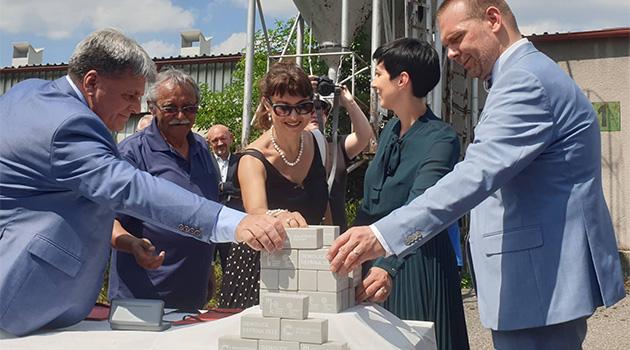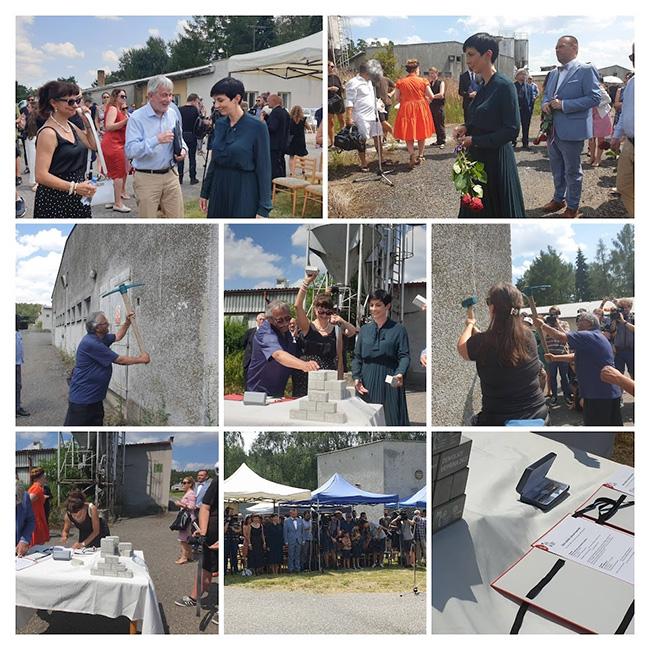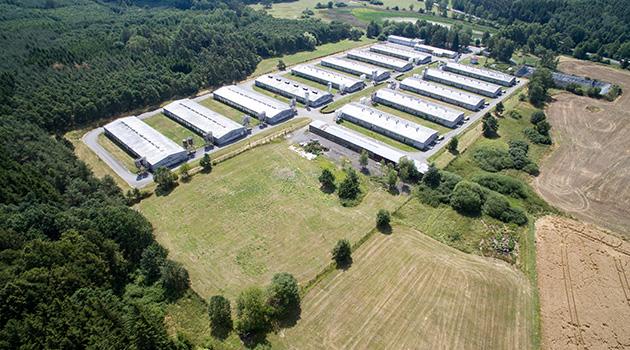Photos and video from the symbolic demolition of the industrial pig farm on the site of the former concentration camp for Roma at Lety u Písku, Czech Republic

Director of the Museum of Romani Culture Jana Horváthová has called yesterday’s symbolic launch of the demolition of the industrial pig farm at Lety u Písku, Czech Republic a breakthrough moment; the farm was built in the 1970s over the site of a WWII-era concentration camp for Roma and Sinti there. ROMEA TV broadcast the signing ceremony for the demolition live.
“Today is a breakthrough moment for us. We’ve been planning this for a long time,” the director said.
“I am quite glad the Museum of Romani Culture was given the honor of building something here, it was not always at all clear that it would happen. It is an enormous commitment and it’s not easy, because building the future memorial is quite a costly endeavor, but I believe we will be supported not just by our Norwegian partners, but also by the Czech Republic, we have this support through the Culture Ministry,” the director said.
“We’re just at the beginning, but it’s an essential starting point. The demolition is an imperative necessary to building a dignified memorial on the site of what was the so-called ‘Gypsy Camp’, the de facto concentration camp, to honor the Holocaust victims of Romani and Sinti origin from Bohemia,” she continued.
“I hope that those of us who perceive this day as an essential milestone in the history of the Roma are in the majority,” the director added. According to Czech Culture Minister Martin Baxa, building the memorial at Lety is one of the Government’s internationally significant activities.
“After years of running in place, finally this idea began its transformation into concrete deeds today. The first step in this direction was taken by my predecessor, Daniel Herman, who managed to push through the buyout of the industrial pig farm by the state,” Baxa said.
“I’m very glad that I and the teams of the Czech Culture Ministry and the Museum of Romani Culture have managed to find financial resources and a way to resolve this thanks to which we are able to be here today,” said the minister. The demolition yesterday was symbolic and initially involved the politicians and others present removing concrete blocks from a stack, each of which symbolized one of the buildings on the farm.
VIDEO
Čeněk Růžička of the Committee for the Redress of the Roma Holocaust in the Czech Republic, a descendant of Lety survivors who lost family there, then took up a pickaxe and symbolically struck one of the actual feed halls. Others present used hammers to break in the windows of that same feed hall.
The demolition company will begin the preparation work for the demolition on 25 July, after which it will actually be demolished. The cost of the demolition was originally estimated by the state at CZK 110 million [EUR 4.5 million], which has been allocated for that purpose.
Ultimately, however, the demolition is likely to cost less than CZK 10 million [EUR 410,000], because thanks to the rising prices of construction materials, there is currently great interest in purchasing what the demolition will generate. “The metals alone on the roofs of these buildings are worth tens of millions of crowns,” Baxa said.
Speaking as he did during the commemorative ceremony in May at Lety, the Culture Minister apologized for the policies of the various parties who have either disregarded or ignored the “dark story” of Lety previously. Demolition of the farm should be completed by the end of November or by the end of the year at the latest.
PHOTO GALLERY

Bids to demolish the facility were submitted by 17 interested companies. The contract was finally awarded to the AWT rekultivace company.
The Czech state bought out the farm four years ago. Yesterday was the final opportunity to tour the grounds of the farm in the presence of activists and eyewitnesses to this history.
The building of the memorial will cost more than CZK 100 million [EUR 4.1 million]. Part of that should be covered by Norway Grants and part by the Czech state.
The museum is hoping to be able to open the memorial next year. Its first phase will be finished, the cost of which should be covered by Norway Grants in large part.
VIDEO
“[The first phase] is meant to be the building of the center for visitors with a permanent exhibition and the recultivation of the remembrance site at the provisional burial site. The [cost] of the memorial is approximately in excess of CZK 100 million, the entire grounds are enormous, more than 100,000 square meters, and the entire recultivation and planting of a forest in this space is going to take a lot of hard work,” the director said.
Prince Karel of Schwarzenberg is donating seedlings to the museum for the Lety memorial, the director said. The industrial pig farm that was in operation at the site from the 1970s until the spring of 2018 overlaps the former site of the WWII-era camp, which was used for different purposes under different names.
As of August 1942, the facility at Lety u Písku (just like its counterpart in Hodonín u Kunštátu in Moravia) became what was called a “Gypsy Camp” where, unlike the two previous kinds of camps there, entire families of Romani origin were imprisoned in inhuman conditions and it was transformed thereby into a concentration camp. What was called “Gypsy Camp I – Lety” saw a total of 1,309 persons pass through its gates, of which at least 326 died there.
Most of the victims who died of their treatment at Lety were children. In 1943, immediately after the remaining children, men and women were sent en masse to an all but certain death in Auschwitz II-Birkenau, the camp buildings were razed to the ground and set on fire.
